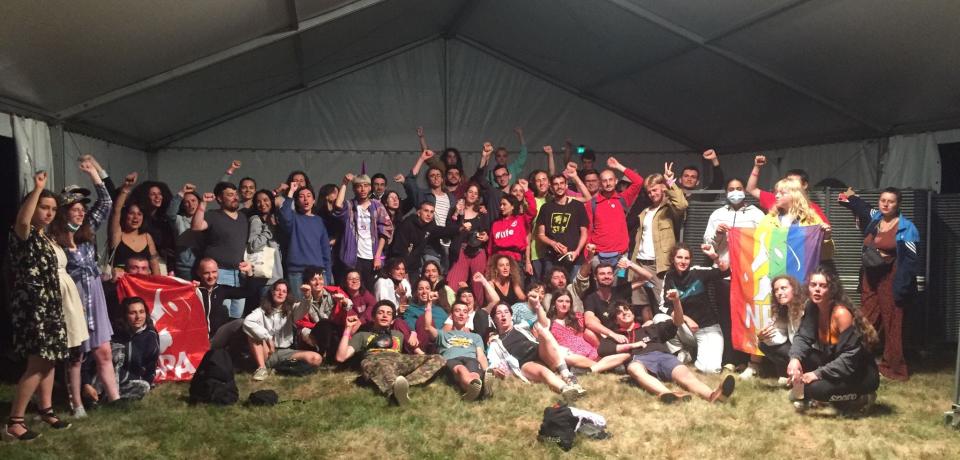
Between July 23 and 29, around 200 young people gathered to celebrate the 37th edition of the Revolutionary Youth Camp organised by the Fourth International in Vieure (France).1 After almost three years since the last camp, the hope, motivation and emotion of returning to share self-managed spaces of camaraderie, support and mutual learning were enormous. And it certainly did not disappoint.
One of the greatest difficulties we have when it comes to explaining and developing our political project for society is to bring our theoretical proposals to praxis with maximum consequences. They accuse us of being utopian or idealistic and perhaps we are, but we need oases in which to show how a fair, democratic, supportive, open and empathetic society where the division of tasks, interpersonal relationships and collective interests prevail over the principles of exclusion, competitiveness and individualism prevailing in capitalist societies.
That is what the revolutionary youth camps are about: of understanding the revolutionary organisation as part of a joint learning process of our own struggles, but also of sharing experiences of struggle and resistance with comrades from the global north and south who allow us to walk towards an ecosocialist, feminist, queer, anti-racist and anti-capitalist horizon.
Thus the program, which is usually divided into thematic days, tried to offer a broad look at the main issues that affect the crisis of neoliberal capitalism and that help us build poles of radicalisation in youth. It placed special emphasis on the need to bet on ecosocialism as our lives depend on it; to stand firm in the anti-imperialist struggle and against the radicalisation of authoritarian neoliberalism; to vindicate the importance of LGBTQI+ struggles not only on a cultural level, but also in the materialist intersection of advancing collective rights and freedoms; to delve into the advances that feminism has made and discuss how to go on the offensive against reactionary discourses. Finally, the importance and necessity of having organic structures that allow us to organise rage internationally was also addressed, enabling us to weave common strategies against a system that devours, crushes and marginalises us.
All of this was developed through plenary activities that addressed how to be revolutionary in a world in flames, how feminist and LGBTQI+ struggles are a threat to capitalism, the characterisation of authoritarian neoliberalism and its attacks against international solidarity networks, how to decolonise society, the role of youth in the class struggle and the importance of organising ourselves to crush capitalism. On the other hand, educational activities also took the form of workshops in which participants elaborated specific problems or shared experiences of international struggle. Among them, we can highlight the need to bring to the debate aspects such as new forms of relationships and radical ways of loving, the importance of talking about capitalism and mental health, the new struggles in which youth play a central role, as is the case with housing and the fight against speculation or the Marxist theory of the state.
At the same time, spaces for women, LGBTQI+ and people of colour were created which, in addition to being safe places for those who are part of the group, also allowed us to go deeper into the discussions and horizons towards which feminist, queer and anti-racist struggles are directed.
In short, the camps are an opportunity for political training, but they are also the best option for weaving personal networks of friendship, sisterhood and camaraderie, which are essential to the societies we aspire to build. In other words, to harden ourselves without losing our tenderness, because tenderness is revolutionary and knows no borders. Therefore, I would like to thank all the compañeras for making the camps a space that truly becomes a reference point when imagining alternative futures. In difficult times for social movements and the radical left, enjoying places where utopia becomes a reality is a pill that enables us to recharge our batteries, to focus on youth building along a new political path. Paraphrasing Durruti, “ruins don't scare us because we carry a new world in our hearts. And that world is growing right now.” For this reason, understanding the revolutionary organisation as part of a joint learning process of our own struggles, and sharing experiences of struggle and resistance with comrades from the global North and South, is a ground-breaking and transformative exercise that inspires us to stand firm until victory. Long live the Revolutionary Youth Camps. Long live the Fourth International.
1 August 2022
Diego Fernández Gómez is a militant of Anticapitalistas in the Spanish state
Article published in Poder Popular. Translated by David Fagan for fourth.interrnational.
- 1Delegations were present from Belgium, Denmark, England and Scotland, France, Italy, Portugal, the Spanish state and Switzerland, and comrades from Brazil and Mexico. The camp was also pleased to welcome comrades from Ukraine and Russia and adopted a statement of solidarity with their resistance to the war. https://internationalviewpoint.org/spip.php?article7767